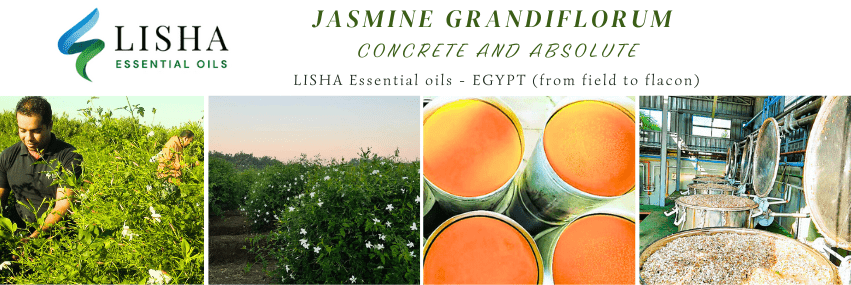JASMINE ABSOLUTE AND CONCRETE PRODUCED BY LISHA ESSENTIAL OILS – EGYPT
Jasmine Grandiflorum, holds a special place in the world of aromatics and perfumery, among the leading producers of this exquisite flower, Egypt stands out as a top supplier, thanks to its unique climate, fertile soil, and centuries-old agricultural expertise.
The Essence of Egyptian Jasmine
Egyptian jasmine (Jasminum grandiflorum L.) is widely recognised for its intensely sweet, rich floral scent. Moreover, this variety thrives particularly well in the warm and sunny climate of Middle and delta of Egypt, where farmers have perfected the art of cultivating and harvesting jasmine over generations.
Why Egypt is Ideal for Jasmine Cultivation
Several factors make Egypt a global leader in jasmine farming:
- Climate: Hot, dry summers and mild winters provide ideal conditions for jasmine growth.
- Soil: The alluvial soil near the Nile is rich in nutrients and moisture-retentive.
- Skilled labor: Egyptian farmers possess deep-rooted knowledge of jasmine, passed down through generations.
- Export infrastructure: Egypt has a well-established network for processing and exporting jasmine flowers and oils to Europe..
From Flower to Fragrance: Jasmine Essential Oil Production
Once harvested, Jasmine Grandiflorum flowers are quickly processed to produce jasmine absolute — a concentrated essential oil prized in luxury perfumery. The extraction process typically uses solvent extraction, as steam distillation would destroy the delicate aromatic compounds.
Egyptian jasmine essential oil is a key ingredient in many perfumes and skincare products, thanks to its deep floral complexity, long-lasting fragrance and natural mood-enhancing properties. For these reasons, major global fragrance houses often rely on Egyptian jasmine oil to create their signature blends.
Sustainability and Future Outlook
Jasmine farming in Egypt, is not only supports the fragrance industry, but all things considered provides livelihoods for thousands of families in particularly women. In many regions, the jasmine harvest represents a critical source of seasonal income.
As global demand for natural essential oils continues to grow, Egypt is working to maintain sustainable jasmine cultivation practices. These include:
- Supporting organic farming initiatives
- Encouraging fair labour conditions
Investing in eco-friendly extraction technologies
This commitment ensures that Jasmine Grandiflorum Egypt remains a sustainable, high-quality product for global markets.

